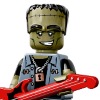dragonsurfer

Joined: Apr 17, 2008
Posts: 128
|

Posted on Apr 17 2018 03:17 PM
Tqi wrote:
So, there's a bunch of technical misinformation here. Please permit me to see what I can do about this.
CD's don't last long. USB sticks don't last long.
Pressed optical discs like DVD movies, Laserdiscs and commerical music CD's have a lifespan that's derived from two factors: material build quality and wear and tear. A lot of cheaper pressed discs suffer from 'rot' over time where either the materials degrade, or the adhesive that attaches the plastic disc to the data layer does. This is why many 1990's Laserdisks are now unplayable, and why my first CD (Graceland, a late 90's pressing) is also dead. Some will last five years, some will last a hundred and there's no easy way to tell in advance. Additionally, The more you play them, the more you wear them, although compared to vinyl and tapes this is relatively slow.
Flash drives have the same basic failure mechanisms, but their primary mode of failure is the NAND write cycle limit. Flash memory does need to be refreshed after repeated reads, but only after a few hundred thousand reads ('Read disturb' effects). This gives a reasonable lower bound for the drive of 1x10^10 reads, assuming that there is no wear levelling or overprovision. Both of these will however normally be available on a flash drive so we can safely assume that mechanical stress on the connector is likely to be the most common limiting factor for the lifespan of our drives given the hypothetical use case.
With optical disks, there is an exception to the lifespan: home-writable discs. Commercial OD's are pressed in a method not entirely unlike Vinyl, leaving permanent physical indentations in a metal sheet. By contrast, home-writable media (CD-R(W), DVD-RAM, BD-R, etc) uses an organic dye based recording layer. This has a relatively rapid degradation which is accelerated by high storage temperatures and repeated use. A lifespan of 10 years is generally considered 'optimistic' for this kind of disc. The only exception is the 'M-Disc' standard for Blu-Ray and DVD media which uses special drives and media for an extended lifespan.
Finally, USB2... I don't see that vanishing for a few years yet. Even if USB-C does entirely replace USB-A on computers, too much existing technology exists that use USB 1.0, 1.1 and 2.0 signalling to allow manufacturers to remove electrical compatibility. As such, USB-C will support simple adapters to current drives for a long time yet. Additionally, the ubiquity of HDMI and the availability of USB 3.0 speeds over USB-A makes it unlikely that consumer equipment will abandon the physical sockets soon, either.
Similarly, a common alternative to USB for flash storage is Secure Digital, which was originally designed for music sales. These just had their first connector upgrade since 1999, which is fully backwards compatible with normal SD, and with 1997's MMC. So a MicroSD shipped with a passive micro-SD to SD adapter is still a viable format for long-term use as well. Because of their standardisation in digital cameras and smartphones, these slots aren't going anywhere either.
In terms of practicality... The war is over, and the internet won. There are five useful ways for bands to distribute music at this point:
- Streaming. Youtube, Spotify, internet radio stations, etc.
- iTunes store.
- TheBuccaneerCove.org
- CD's, but only if you release music that will be primarily enjoyed by the kind of people who "Don't like putting my credit cards details on websites, you never know who to trust and Derek from work lost a thousand pounds, it shouldn't be allowed."
- Vinyl, but only if you release music that will primarily be enjoyed by the kind of people who wear plastic framed glasses, skinny jeans and 35mm cameras.
Distributing music on SD or USB flash drive can have value as a promotional tool, like a printed USB disk in a marketing pack; but be aware that if any employee of a label of any meaningful size plugs your flash drive into their PC: their IT department will spend the entirety of the following week doing their utmost to have them fired. So, it's more useful to target that sort of thing for private individuals instead of professionals.
To answer the original question: Nope. I don't even currently own a record player since mine broke a while back, but I'm still picking things up on Vinyl. Free download codes are great, but even then I mostly listen to music on YouTube (or NSSR for surf stuff). But, I'd be more likely to do so for a more interesting disk: an SD card with 8GB of photographs, high quality video, exclusive content, gp5 tab files and txt lyric sheets, backing tracks to play along to... things like that? Maybe! But I doubt I'm in the majority.
Thanks for the in-depth.
Which then leads us all to the edge of the cliff which is cloud servers where our devices are being planned as we speak to have no memory capability at all, no connectivity save for a power supply port (if even that) and be mere portals onto the cloud where all our memories will be stored, photos, word files, music with bio metric log-on access only, so they will know where you are on the planet, who you are, your family, your friends, your job, and all such information belongs to the controllers of the collective and not us.
The internet is being used to scoop up ideas before the inventor can get it to market which is one benefit (to them) for you storing your art, recording and mixing your song into a cloud based DAW.
Intellectual property will be theirs not yours. Hence data mining and sharing of your information on social media is in the works.
CD's were around in the 1960's but the technology not released to the public until decades later just to show how these things are planned well in advance of our awareness of them.
Basically the public is 40 years behind the technology when it gets released to us as the "new thing."
That said, the planned integration of virtual reality, merging with AI when the "head-down" generation is already in force, thus from radio, to TV, to computers, to Androids, becomes then chip implants for humans to access our email not surprisingly walking around with virtual goggles as per Zuckerberg's new horizon, will us humans interact with the world.
If someone is offering music on a flash drive, you like the music, and there is no other alternative, then you are forced to buy the media. It's not any different than the way the whole system has been set up for the last 100 years.
The media we are given is planned obsolescence and for a reason.
We are to be weened off the initial stages, devices, connectivity leading us to the next interactive media.
Doing an Incubus concert last February I was told that the guitar player Mike Einziger, is planning with other developers to offer MIXHalo, a wifi in-ear connectivity system for concerts to where we can hear the concert not through FOH speakers but through ear-buds.
https://www.engadget.com/2017/05/17/mixhalo-incubus-pharrell/


Mike Einziger, Incubus guitarist and rapper, singer-songwriter Pharrell Williams are principle investors in MIXHalo studio quality wifi headphone concert listening systems, offers the concert goer a different way to experience concert audio.

|
tahitijack

Joined: Nov 03, 2006
Posts: 693
San Clemente, CA

|

Posted on Apr 17 2018 04:22 PM
Then there is our good friends at Apple that ceated iTunes and the iPod. Evenually Apple decided to discontinue the iPod including the popular 160gb classic when sales slowed. When the iPods in operation stated to fail, Apple answered complaints, saying they no longer support the product. You now have a new and very expressive paper weight! Insiders say iTunes is also heading to the technology junkyard as Apple shifts it's attention to streaming.
— Happy Sunsets!
Last edited: Apr 17, 2018 16:27:50
|
dragonsurfer

Joined: Apr 17, 2008
Posts: 128
|

Posted on Apr 17 2018 04:27 PM
tahitijack wrote:
Then there is our good friends at Apple that ceated iTunes and the iPod. Evenually Apple decided to discontinue the iPod 160gb classic when sales slowed. When the iPods in operation stated to failed Apple answered complaints, saying they no longer support the product. Insiders say iTunes is also heading to the technology junkyard as Apple shifts it's attention to streaming.
Yup, the logo says it all.

|
Tqi

Joined: Dec 07, 2014
Posts: 1222

|

Posted on Apr 17 2018 06:15 PM
-
Last edited: Feb 02, 2024 13:44:55
|
dragonsurfer

Joined: Apr 17, 2008
Posts: 128
|

Posted on Apr 17 2018 07:48 PM
Tqi wrote:
For all its faults (there really is no such thing as 'the cloud',
Music on a flash drive is segue into music stored on the internet and recording done on cloud systems.
Might want to be apprised of it now as a peek into the not so distant future.
Not to sow discord.
The cloud is everywhere.
The changes come slowly. The trick is to notice the changes.
Having faith in humanity while not noticing that AI is being progressed until humans are not needed has nothing to do with faith, but with reality.
Robots at McDonalds should be writing on the wall.
http://newsexaminer.net/food/mcdonalds-to-open-restaurant-run-by-robots/
You need a DAW? Get one in the cloud.
https://www.zdnet.com/article/cloud-based-music-recording-studio-soundtrap-raises-6m-in-series-a-round/
I've looked at clouds from both sides now
From up and down and still somehow
It's cloud's illusions I recall
I really don't know clouds at all
https://www.androidauthority.com/best-cloud-storage-apps-for-android-657338/
When the devices we use now reach end of life, no support from the makers, the next devices will as mentioned have no memory storage in the unit forcing us to deal with cloud based storage.
https://en.wikipedia.org/wiki/Cloud_storage
When one considers that during Bach's time, if you wanted to hear music you needed to go see a musician play the song, namely Bach, or play it yourself reading the music sheets. And you had to train yourself to do that. Don't know too much if there were cover tribute bands for Bach's music during his time.
I would guess to say, why not.
Not so today, Bach is at the click of a mouse. You don't need to go anywhere and don't need to go to Julliard to learn to entertain yourself unless you want to.
Notice how generations into the future, it's on a flash drive.
My Yamaha P60 plays back Bach and 49 other classical piano pieces stored in internal memory from the factory.
First song on the playback list:
Prelude (Wohltemperierte Klavier I No.1) J.S.Bach
We might want to hang onto the old playback mediums, even older digital devices that allowed us to store our own memory.
Vinyl is gold.
Keep older computers/recorders alive to playback files.
Most recording studios keep the older gear they used to record in good working condition because you need a 4 track Studer J37 to play back Sgt. Peppers tracks.
Driver-less cars are already planned for our future and are a reality.
I would hope humans retain control.

The California DMV just authorized the use of driver-less cars on California highways this April 2018.
https://www.recode.net/2018/2/26/17053898/driverless-cars-self-driving-california-dmv-remote-operated-autonomous-testing
Control of these cars is in a "cloud."
http://www.ipwatchdog.com/2017/01/21/cloud-robotics-mean-driverless-cars/id=77173/
I remember driving down I-15 in the late 1980's, and on the median was a fenced-off highway to where I watched driver-less cars going up and down from Escondido to San Diego.
That was 30 years ago.
All this technology goes hand in hand.
Last edited: Apr 17, 2018 20:38:17
|
montereyjack66

Joined: Jul 23, 2014
Posts: 646
LA -ish






|

Posted on Apr 17 2018 08:46 PM
This is a great discussion. I would add that, a more immediate aspect is - in an era when people are overwhelmed with choice, possibility, and distraction (not to mention deliberate and well intended misinformation), one of our (we the people who worship reverb and such) concerns is how do we get the potential fan or distracted human being to pay attention, connect, appreciate, internalize and want to connect again? AND not turn their attention elsewhere halfway through? All the discussion on various modes, and trends,and product qualities is absolutely worthwhile. On the other hand, you need to look in the mirror and ask yourself "Why do I choose to make music?" and "Is other people relating to my/our music important and if so, how important?" along with "How much is ANY music important to them?". Generationally speaking, previous generations often considered music to have great value and import. Not so sure that's the an automatic given any more. Right now, the only thing that isn't easily duplicated (yet) is the interwoven heat and electricity that can/may exist with a live music performance and an interested audience. It's unclear to me that large numbers of people will be willing to pay attention let alone pay for recorded music for much longer. But,as indicated above,thin gs can change and probably will.
— mj
bent playing for benter results
Do not attempt to adjust your TV set.
https://www.facebook.com/Bass-VI-Explorers-Club-179437279151035/
https://www.facebook.com/Lost-Planet-Shamen-366987463657230/

Last edited: Apr 17, 2018 23:03:48
|
dragonsurfer

Joined: Apr 17, 2008
Posts: 128
|

Posted on Apr 17 2018 08:57 PM
montereyjack66 wrote:
It's unclear to me that large numbers of people will be willing to attention let alone pay for recorded music for much longer.
Correct.
It is download the songs/videos for free, come pay to see the concert.
Music cannot be controlled on the internet but attending concerts can.
Touring is a must if an artist wants to be compensated.
Older artists are still touring just to earn a living.
|
synchro

Joined: Feb 02, 2008
Posts: 4564
Not One-Sawn, but Two-Sawn . . . AZ.





|

Posted on Apr 17 2018 10:57 PM
I doubt that we’ll see Cloud DAWs take over completely. I can give you two reasons, latency and jitter.
A while back, I tried playing guitar with a friend using a Skype connection. There wasn’t a lot of latency, but there was just enough that we’d get out of sync fairly rapidly. Latency can be a formidable foe in a self-contained DAW, using cloud processing would not make things any better.
Jitter is the dirtiest word a VOIP administrator can hear. It means variable delay and just a tiny amount of jitter can completely obliterate a phone conversation, because if some packets take longer than others they will be assembled in the wrong order. Unlike TCP data transfers which use sequence numbers and retransmission requests to keep the data intact, voice systems use UDP for the RTP (Real Time Protocol) and UDP just tosses it out there, first come, first served. If you wanted to use TCP to stream to a cloud based DAW, you would have to have some storage and, by definition, you would not be streaming in real time, which means that the cloud DAW would have to be able to calculate delay in order to avoid gaps in the recording.
Simple voice has to be compressed to run on bespoke circuits, such as a PRI, music would need a lot more bandwidth. If you tried to record music using the fairly generous G722 codec it would sound like AM radio, at best. If a more aggressive codec was used the result would sound only slightly better than Rudy Vallee records from the late 1920s.
Even with very high bandwidth, such as FTTD (fiber to the doorstep) there would be serialization lag, latency while crossing the Internet and the ever present threat of jitter if packets were routed differently. Sorry, I just don’t see this happening.
— The artist formerly known as: Synchro
When Surf Guitar is outlawed only outlaws will play Surf Guitar.
|
dragonsurfer

Joined: Apr 17, 2008
Posts: 128
|

Posted on Apr 18 2018 01:43 AM
Sorry, I just don’t see this happening.
The technology is there, it's been started and as with digital recording when it first broke on the scene, there were naysayers from the reel-to-reel industry. Now we know that given time, the technology develops and new ideas present themselves. Most studios who used 2-inch tape are now using professional DAW's even if connected to vintage mega-buck consoles.
ISDN (Integrated Services Digital Network) is presently used for remote voice over real time recording. But the system is expensive and only pros invest in this to get voice over tracks from around the globe without having to travel.
I doubt that we’ll see Cloud DAWs take over completely.
Although the supposition was not postured, the above quote "completely" does put a different spin on the matter and is a tad hasty at this juncture, seeing as how the technology is still in its infancy.
It is easy to forget that with anything, we cannot predict what will be invented after we've made such claims, just as no one thought that digital would take over the use of tape.
In 1999 I paid $1,000 for an 18gb (EIGHTEEN) SCSI drive. Today most people would choke at the thought of spending that much and with its jittery SCSI cables which were a pain to work with, while today for a few bucks we can buy a 64gb SDcard no moving parts.
There are older online cloud systems like OHM. As with the advent of the DAW it took time to get it to where it is conceivable enough to be viable.
Keep in mind that recording on the pro level is basically set aside for those who are worth recording. Granted this sounds harsh but it is true.
The internet at the moment is being controlled for speed. And as mentioned, the public is always 40 YEARS BEHIND the technology actually invented. While we fuss around with technically 40 year old technology in 2018 there are technologies not shared with us as we are being drip-fed as to the latest innovations. Let that sink in for a moment.
It is naive to assume based on what we have now that we will not advance further especially when the new unforeseen ideas come into play.
While ISDN is/was being used, a Pro Tools plugin known as
SOURCE CONNECT allows you to record live world wide, direct access, studio to studio, no ISDN, hi-rez.
Again a few years old but hey, it's out there.
https://source-elements.com/products/source-connect
https://soundcloud.com/source-elements/source-connect-48khz-16bit?in=source-elements/sets/source-connect-examples
|
dragonsurfer

Joined: Apr 17, 2008
Posts: 128
|

Posted on Apr 18 2018 01:44 AM
Many pro session players who need to keep working and with the economy down to fill the expensive recording studios have opted to build their own project studios to provide instrumental or vocal parts to add to another project using the internet.
|
synchro

Joined: Feb 02, 2008
Posts: 4564
Not One-Sawn, but Two-Sawn . . . AZ.





|

Posted on Apr 18 2018 08:17 AM
I’m been in high tech for 25 years and it takes a lot more than an advertisement to convinnce me. I don’t care what innovation they come up with, it takes time for a signal to travel both over the medium (copper UTP, fiber, etc) but also through each device. ISDN is a serial technology, hence serialization latency. BTW, ISDN is not the wave of the future, it’s the wave of the past. I have ISDN where I work because all we have available is a copper UTP Link to the PSTN. In places where fiber (much higher bandwidth) is available, it’s feasible to bypass a serial link altogether and run SIP trunks over MPLS. However, this does not come cheaply.
A single PRI, which is an ISDN line with 23 bearer channels and one delta channel will set you back somewhere around $700 a month in our locale, but it’s not made for carrying high bandwidth music. It’s channelized using TDMA to sample 23 discreet phone calls and samples 23 different channels in rotation. Simply stated, any music sent over an ISDN would be highly compressed and would, literally, have the sound quality of a phone call.
The blurb above mentioned that it could be synchronized in software, and that’s possible, but carries significant overhead. It won’t happen without local memory and storage because transferring a data stream in a manner which can compensate for latency and jitter is requires buffering. It also requires high uplink speeds which many asynchronous internet connections do not provide for.
What they are talking about is possible, but it’s quite unlikely to happen in real time. As TQI pointed out, “Cloud” simply means someone else’s computer, which is to say, remote processing as opposed to distributed processing. Ohm will have to charge accordingly, in the long run. Processing costs money and server software is licensed by the core in most cases.
The Internet is being controlled for speed? I’d love to see that statement defended. Speed of a signal is a physical property. Bandwidth can be controlled and traffic can be shaped using various methods, but it is to no one’s advantage to delay traffic and doing so would be costly.
The Internet is a packet switched system, designed for resiliency. Each packet of data has a source and destination address, much like a piece of mail, and every router along the way decides where to forward that packet based upon routing information that can change rapidly. It’s quite possible for two sequential packets to take wildly differing courses to the same destination. The routing protocols are specifically designed to allow this as a way of dealing with the failure or congestion on specific links. If anyone tried to delay transmission they would have to have enormous storage capacity and would end up with a significant backlog. Soon the route would be seen as compromised and packets would be routed through other links.
It is possible for ISPs to throttle bandwidth to subscribers; bandwidth is what they sell and they aren’t about to give any away. TCP can handle this sort of thing easily, but at the backbone level, such throttling would cause all sorts of TCP retransmissions and a cascading effect which would, once again, result in a route being marked as bad in the routing tables of every adjectent router. Backbone providers make money for passing packets, not for having their routers on the sidelines while hold-down counters tick away.
It’s a nice idea, but I suspect that Ohm Studio’s use of the phrase “real time” may prove much easier to say than to do.
— The artist formerly known as: Synchro
When Surf Guitar is outlawed only outlaws will play Surf Guitar.
|
Brian

Joined: Feb 25, 2006
Posts: 19351
Des Moines, Iowa, USA










|

Posted on Apr 18 2018 08:18 AM
We are way, way, way off topic here. This is a recent trend that I am growing weary of. Please be respectful of the original poster. Start a new thread if you want to wander off the path this far.
It just seems like a few people are just trying to one-up each other here in some kind of intellectual contest. It's tiresome. Please stop.
— Site dude - S3 Agent #202
Need help with the site? SG101 FAQ - Send me a private message - Email me
"It starts... when it begins" -- Ralf Kilauea
|
Gilette

Joined: May 04, 2014
Posts: 734



|

Posted on Apr 18 2018 09:20 AM
Right. USB's are fine for distributing music. It's up to the user to back it up and re-use the drive.
|
josheboy

Joined: Mar 13, 2009
Posts: 2367
Twin Cities, MN




|

Posted on Apr 18 2018 09:29 AM
Personally, I think for 1 album, a USB thumb drive might be a bit overkill. I think a download card would be better.
But for a catalog/discography, I think its a cool alternative to a box full of CDs/LPs or HUGE download repositories.
Recently the HP Lovecraft Historical Society (of which I am a proud member. Ludo Fore Putavimus!) released a USB thumb drive filled with every narrated Lovecraft story. Many gigs of high bitrate MP3s, and many many files totally make sense for the media. They ended up getting custom USB drives made as well, so it was a cool looking "package" too!
Last edited: Apr 18, 2018 09:30:36
|
Tqi

Joined: Dec 07, 2014
Posts: 1222

|

Posted on Apr 18 2018 12:07 PM
-
Last edited: Feb 02, 2024 13:45:35
|
Pongo

Joined: Mar 07, 2015
Posts: 31
Glasgow

|

Posted on Apr 28 2018 03:47 PM
CD or nothing. It's never been easier to get a CD pressed and have some artwork knocked up.
|
PolloGuitar

Joined: Feb 26, 2006
Posts: 5125
San Francisco











|

Posted on Apr 28 2018 04:34 PM
I want to thank everybody who had constructive ideas about distribution via USB drives. I've decided to go with CDs & download cards only. Ultimately, it came down to price break- a CD is about $1.25 per unit, and the USB is about $4.
— Buy Endless Drummer @ Bandcamp
Frankie and the Pool Boys website
Buy Speed of Dark @ Bandcamp
Pollo Del Mar website
My Blog- Euro Tour Blog
Pool Boys on Spotify
INSTAGRAM
Frankie & The Pool Boys on Facebook
Pollo Del Mar on Facebook
DJ Frankie Pool Boy on North Sea Surf Radio
|
DeathTide

Joined: Apr 13, 2018
Posts: 1380
New Orleans






|

Posted on Apr 28 2018 06:59 PM
I don’t think the off-topic was really that off as it relates to the distribution of music into tomorrow. It’s been one of the coolest reads! My favorite part is the quote “vinyl is gold” haha.
Recently a NO band put up a $100 bandcamp download, or a cheaper price for an LP + download code. Brilliant.
As much as I love download codes, the vinyl always sounds way better - what’s up with that? Would that be the case in an album with USB and vinyl? And CDs always sound crappier. Cassettes, even with their hiss, sound much better than CDs to me.
Dan Izen
— Daniel Deathtide
|
Tqi

Joined: Dec 07, 2014
Posts: 1222

|

Posted on May 09 2018 01:05 AM
-
Last edited: Feb 02, 2024 13:45:00
|











































